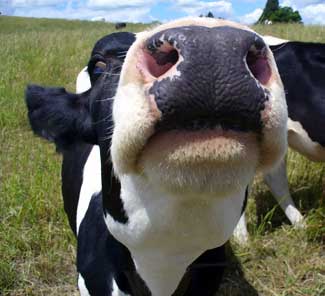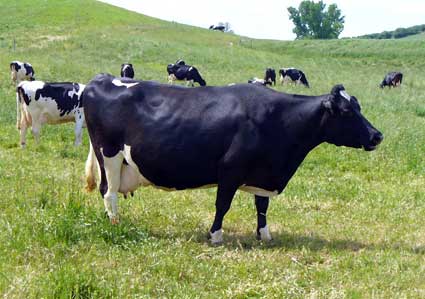MooScience
Enjoy Healthy Dairy Without Guilt (or Weight Gain)
Do you feel guilty for enjoying delicious full fat Greek yogurt, yogurt smoothies, aged cheese, smooth whipped cream, sweet ice cream or other yummy dairy products? Well, feel guilty no longer, these tasty and healthy dairy treats are actually good for your body and your taste buds!
Picture: A curious Holstein heifer gets her moo on the camera.

Hot New Topics in Dairy and Heath:
Add milk to your breakfast to slow carbohydrate digestion
Drinking milk with a high carbohydrate breakfast reduces blood glucose compared to water (Kung et al. 2018). High protein milk (milk with either whey or casein protein added) worked even better. Dairy can also help prevent diabetes.
Dairy fat does not cause heart disease or strokes
There is no link between full fat dairy and heart disease or stroke (de Oliveira Otto et al. 2018). Click here for more on dairy and cardiovascular health.
Men who eat more dairy have higher bone density and spine strength
Men who eat more milk, yogurt and cheese have higher volumetric bone mineral density and spine vertebral strength (van Dongal et al. 2018). Men older than 50 benefited the most from dairy foods.
Eat more yogurt for higher hip bone density and a reduced risk of osteoporosis
A large scale study found that older adults who eat more yogurt have stronger bones (Laird et al. 2017). After adjusting for risk factors like smoking and activity level, each additional yogurt serving in women was associated with a 31% lower risk of osteopenia and a 39% lower risk of osteoporosis. Men had a 52% lower risk of osteoporosis with each additional serving of yogurt.
Whole dairy will not make you fat
You don't have to sacrifice your waist to reap the health benefits of eating dairy. Science shows that creamy whole milk products do not cause weight gain. So go ahead and enjoy some cream in your coffee!
Adding high fat dairy to the DASH diet makes it healthier
A modified version of the DASH diet (Dietary Approaches to Stop Hypertension) replaced low fat dairy servings with full fat dairy foods. This higher fat DASH diet significantly reduced triglycerides and larger sized very low-density lipoprotein (VLDL) particles when compared to the standard DASH diet (this is good). Both DASH diets reduced blood pressure when compared to a control diet (Chui et al. 2015).
Full fat milk and ice cream reduces women's risk of infertility
Women who ate at least one serving of high fat dairy reduced their risk of anovulatory infertility by 85% when compared to women who ate one or less servings of full fat dairy a week (Chavarro et al. 2007).
Dairy sports drinks energize your workout
Put down that unnatural purple drink and try a sports drink that actually delivers. Milk and yogurt drinks are natural whole foods that add muscle building protein, refueling carbohydrates, essential electrolytes, vitamins, and minerals to your workout without the artificial taste and human-made compounds found in many conventional sports drinks.
Debunking Five Common Dairy Health Myths
Myth #1: Dairy is bad for your health.
Dairy is falsely blamed for contributing to obesity, heart disease and cardiovascular disorders.
Truth: People who consume dairy have less risk of dying from all causes.
People who eat delicious dairy products reduce their risk of dying from all causes including heart disease, stroke and diabetes (Elwood et al. 2010)! Dairy promotes health!
People who consume more dairy have less risk of metabolic disease, breast cancer and uterine fibroids. In addition, enjoying milk and yogurt reduces your chance of a hip fracture Sahni et al. 2013, Sahni et al. 2014).
Dairy is a great snack. It contains protein, carbohydrates and fat. Dairy is a good addition to a weight loss program. Eating yogurt accelerates weight loss (Zemel and Sun 2008).
Some dairy products, such as yogurt and kefir, contain beneficial probiotics.
Myth # 2: Milk fat is unhealthy and makes you fat.
Are you tired of dumping skim milk on your morning cereal? Somehow dairy fat has been made the villain of many nutritionists. I believe it is part of the "it tastes good, so it must be bad for you" mind-set. Whole milk products contain numerous health benefits.
Truth: Milk fat is healthy and tastes great too. 
Dairy fat does not cause heart disease (Huth and Park 2012) or diabetes. In fact dairy fat may prevent type 2 diabetes (Mozaffarian et al. 2010, 2012), strokes (Elwood 2004, 2010), and other metabolic disorders.
There are over 400 types of dairy fats and some of them, such as oleic acid and trans-palmitoleic acid, are beneficial to health. Whole dairy products are a natural healthy food.
Myth #3: Whole milk products will make children fat.
Truth: Whole milk will not make children fat (it won't make you fat either)
Special Note for Parents and Caregivers:
I meet many well intentioned people who put their children on a low fat diet including low fat or skim milk. Sadly this diet is often recommended by health professionals (most health professionals are not nutritionists and have little or no training in nutrition).
Children of all ages need full fat for full brain development. If you want your children to reach their full intelligence potential make sure they have enough healthy fat in their diet.
Still think skim milk is better? Several studies reported that preschoolers, children and adolescents who drank skim and 1% milk were significantly fatter than children drinking 2% and whole milk (Berkey et al. 2005, Huh et al. 2010, Scharf et al. 2013). Hun et al. (2010) found that preschoolers who drank whole milk had a lower BMI than those consuming skim milk.

Picture: Three girls study the outdoors. Help your children succeed by giving them healthy full fat milk and yogurt.
Berkley et al. reported that younger adolescents who drunk more skim milk had increased weight gain. In the same study, dairy fat was NOT associated with weight gain. Scarf et al. (2013) looked at 10,700 2 and 4 year olds of all races and ethnic groups and found out that those consuming skim milk were fatter than those drinking 2% or whole milk.
Fat doesn't make you or your children fat. Children need fats, including saturated fats, to thrive. Restricting fat to less than 30% of calories in infants and children can retard growth, decrease visual acuity, and limit mental development.
Myth #4: Acid whey is toxic.
The only thing toxic about acid whey is its name. Unfortunately, 'acid' whey conjures up images of bubbling sulfuric acid, cooking meth in a run down trailer surrounded by plastic pink birds and toothless coworkers, and strange food cartons found at the bottom of a convenience store shelf. However, names can be deceiving.
Truth: Acid whey is a nutritious and healthy food.
Recently acid whey has been villainized by the media. However, this media storm has been fueled by sensationalism not facts. Acid whey is a highly nutritious food that contains nutrients shown to prevent disease and improve health.
If you want to read more about the health benefits of acid whey check out acid whey, common questions about acid whey, lactic acid, alpha-lactalbumin, and lactoferrin.
For more information on milk proteins in general see our pages on whey and casein.
Picture: Holstein cows are commonly used in dairies. They are well known for their outstanding milk production.
Myth #5 Lactose intolerant people can't have any dairy products
Truth: Most lactose intolerant people can tolerate a little dairy without any ill effects.
Most people can consume up to a cup of milk a day with no ill effects. in addition, some dairy products contain very little lactose, such as yogurts and cheeses. For more information see our page on lactose intolerance.
Why I Created MooScience
Are you tired of grand health claims with no evidence to back them up? I created MooScience to dispel some myths about dairy products and milk fat. We don't just tell you our opinion (you can guess that I am pro-dairy); I summarize the scientific studies that support our statements so you can make up your own mind.
Dairy enhances health! Read how dairy enhances weight loss, prevents type 2 diabetes, improves metabolic disorders, helps enhance bone health, prevents cancer, reduces the risk of uterine fibroids, and protects against cardiovascular disease.
For up to date science on the latest news in delicious dairy, check out our information on dairy sports drinks, health benefits of whole milk including why full fat dairy doesn't cause weight gain, and why acid whey has a unnecessarily bad reputation. We have also included the latest research on beneficial compounds found in milk such as oleic acid, lactic acid, lactoferrin and immunoglobulins.
Dairy Links: Websites to Check Out
Quality Laboratory Equipment: Moolap Scientific
Here is a shout out to a company with the good taste to register moosci.com as their website address, Moolap Scientific. This Australian company sells quality laboratory instruments and consumables for inorganic, dairy and food analysis. Check out their dairy and food laboratory equipment. They are from Australia and export to Australasia, Oceania and Asia.
As you can tell from my website, it is impossible to know the exact composition of milk without testing it. Similar looking batches of fluid milk can vary widely in fat content, antioxidants or other factors. To ensure a consistently high quality product you need to test each batch of milk. Good laboratory equipment can make the difference between a great product and a average product.
References
Berkey CS, Rockett HR, Willett WC, Colditz GA. Milk, dairy fat, dietary calcium, and weight gain: a longitudinal study of adolescents. Arch Pediatr Adolesc Med. 2005;159:543-50. Pubmed. Full paper. Chavarro JE, Rich-Edwards JW, Rosner B, Willett WC.A Prospective study of dairy foods intake and anovulatory infertility. Hum Reprod. 2007;22:1340-7. Pubmed. Full paper. Chiu S, Bergeron N, Williams PT, Bray GA, Sutherland B, Krauss RM. Comparison of the DASH (Dietary Approaches to Stop Hypertension) diet and a higher-fat DASH diet on blood pressure and lipids and lipoproteins: a randomized controlled trial. American Journal of Clinical Nutrition, 2015; Pubmed. Full text. de Oliveira Otto MC, Lemaitre RL, Song X, King IB, Siscovick DS, Mozaffarian D. Serial measures of circulating biomarkers of dairy fat and total and cause-specific mortality in older adults: the Cardiovascular Health Study. The American Journal of Clinical Nutrition. 2018; doi: 10.1093/ajcn/nqy117 Elwood PC, Pickering JE, Givens DI, Gallacher JE. The consumption of milk and dairy foods and the incidence of vascular disease and diabetes: an overview of the evidence. Lipids. 2010;45:925-39. Pubmed. doi: 10.3945/ajcn.2010.29866 (full text) Elwood PC, Pickering JE, Hughes J, Fehily AM, Ness AR. Milk drinking, ischaemic heart disease and ischaemic stroke II. Evidence from cohort studies. Eur J Clin Nutr. 2004;58:718–24. Pubmed. doi: 10.1136/jech.2006.053157 (full text) Huh SY, Rifas-Shiman SL, Rich-Edwards JW, Taveras EM, Gillman MW. Prospective association between milk intake and adiposity in preschool-aged children. J Am Diet Assoc. 2010;110:563-70. Pubmed. Full text. Huth PJ and Park KM. Influence of Dairy Product and Milk Fat Consumption on Cardiovascular Disease Risk: A Review of the Evidence. Adv Nutr. 2012;3:266–285. Pubmed. doi: 10.3945/an.112.002030 (full text) Kung B, Anderson GH, Paré S, Tucker AJ, Vien S, Wright AJ, Goff HD. Effect of milk protein intake and casein-to-whey ratio in breakfast meals on postprandial glucose, satiety ratings, and subsequent meal intake. Journal of Dairy Science. 2018; doi: 10.3168/jds.2018-14419 Laird E, Molloy AM, McNulty H, Ward M, McCarroll K, Hoey L, Hughes CF, Cunningham C, Strain JJ, Casey MC. Greater yogurt consumption is associated with increased bone mineral density and physical function in older adults. Osteoporosis International. 2017;28:2409-19. doi: 10.1007/s00198-017-4049-5 Mozaffarian D, Cao H, King IB, Lemaitre RN, Song X, Siscovick DS, Hotamisligil GS. Trans-palmitoleic acid, metabolic risk factors, and new-onset diabetes in U.S. adults: a cohort study. Ann. Intern. Med. 2010 Dec 21;153(12):790-9. Pubmed. doi: 10.1059/0003-4819-153-12-201012210-00005 (full text) Mozaffarian D, de Oliveira Otto MC, Lemaitre RN, Fretts AM, Hotamisligil G, Tsai MY, Siscovick DS, Nettleton JA. Trans-Palmitoleic acid, other dairy fat biomarkers, and incident diabetes: the Multi-Ethnic Study of Atherosclerosis (MESA). Am J Clin Nutr. 2013;97:854-61. Pubmed. doi: 10.3945/ajcn.112.045468 Scharf, RJ Demmer RT, DeBoer MD. Longitudinal evaluation of milk type consumed and weight status in preschoolers. Arch Dis Child. 2013;98:335-340. doi: 10.1136/archdischild-2012-302941 Sahni S, Mangano KM, Tucker KL, Kiel DP, Casey VA, Hannan MT. Protective Association of Milk Intake on the Risk of Hip Fracture: Results from the Framingham Original Cohort. J Bone Miner Res. 2014 Apr 24. Pubmed. doi: 10.1002/jbmr.2219 Sahni S, Tucker KL, Kiel DP, Quach L, Casey VA, Hannan MT. Milk and yogurt consumption are linked with higher bone mineral density but not with hip fracture: the Framingham Offspring Study. Archives of Osteoporosis, 2013;8:119. Pubmed. doi: 10.1007/s11657-013-0119-2 van Dongen LH, Kiel DP, Soedamah-Muthu SS, Bouxsein ML, Hannan MT, Sahni S. Higher Dairy Food Intake Is Associated With Higher Spine Quantitative Computed Tomography (QCT) Bone Measures in the Framingham Study for Men But Not Women. Journal of Bone and Mineral Research. 2018;33:1283-90. doi: 10.1002/jbmr.3414
